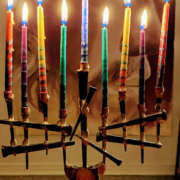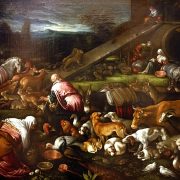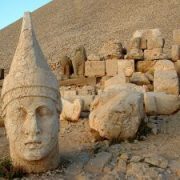This article is weird. Not by design; it just happens to deal with a topic most churches ignore—the UFO phenomenon. And it connects dots between “ancient aliens,” the 20th century’s most notorious practitioner of the occult (he called himself the Great Beast 666), and an impoverished author of gothic horror fiction.
We’ll start with the latter character first.
H. P. Lovecraft (1890-1937) is one of the giants of 20th century literature, although he wasn’t recognized as such until after his death. And because he wrote scary stories, he wasn’t the kind of writer who got invites to fancy parties. Lovecraft and his friends, most of whom he knew through volumes of letters—by one estimate, 100,000 of them—that some believe were more influential than his published work, wrote to entertain, usually by crafting terrifying tales and conjuring monstrous images of overpowering, inhuman evil.
As a child, Lovecraft was tormented by night terrors. Beginning at age six, young Howard was visited by what he called night-gaunts—faceless humanoids with black, rubbery skin, bat-like wings, and barbed tails, who carried off their victims to Dreamland. The nocturnal visitors were so terrifying that Howard remembered trying desperately to stay awake every night during this period of his life. It’s believed that these dreams, which haunted him for more than a year, had a powerful influence on his fiction.
From a Christian perspective, it’s a shame that Lovecraft’s mother, who raised Howard with his aunts after his father was committed to a psychiatric hospital when Howard was only three, failed to recognize the phenomenon for what it probably was—demonic oppression of her only child. But by the late 19th century, the technologically advanced West didn’t have room in its scientific worldview for such things. In fact, Lovecraft claimed to be a staunch atheist throughout his life.
Ironically, despite his disbelief, the fiction of H. P. Lovecraft has been adapted and adopted by occultists around the world after his death. The man who died a pauper not only found an audience over the last eighty years, he inspired an army of authors who have preserved and expanded the nightmarish universe that sprang from Lovecraft’s tortured dreams.
Although Lovecraft claimed he didn’t believe in the supernatural, he was more than happy to use the spirit realm as grist for his writing mill. Lovecraft apparently saw potential in the doctrines of Blavatsky for stories that would sell. They did, but mostly after his death. During his lifetime, Lovecraft was barely known outside the readership of pulp magazines, the type of publication called a “penny dreadful” a couple generations earlier in England.
While Lovecraft may have rejected the idea of a lost continent or two as the now-forgotten motherland of humanity, the concept served him well as an author. The notion that certain humans gifted (or cursed) with the ability to see beyond the veil were communicating with intelligences vastly greater than our own also made for compelling horror. Lovecraft viewed the universe as a cold, unfeeling place; so, in his fiction those intelligences, unlike the kindly ascended masters of Blavatsky’s world, had no use for humanity — except, perhaps, as slaves or sacrifices. The horror of discovering oneself at the mercy of immense, ancient beings incapable of mercy is a common theme in Lovecraft’s tales, and he gave those ideas flesh and bone with carefully crafted prose that infused them with a sense of dread not easily or often distilled onto the printed page.
It’s fair to say that Lovecraft’s style of gothic horror has had a powerful influence on horror fiction and film over the last 75 years. Stephen King, Roger Corman, John Carpenter and Ridley Scott, among others, drew on Lovecraft’s style if not his Cthulhu mythos directly. Maybe that’s not the kind of legacy left by Ernest Hemingway or F. Scott Fitzgerald, but compare the number of people who have seen The Thing, Alien, or any movie based on a King novel (The Shining, The Stand, It, etc.) to the number of people who’ve read Hemingway or Fitzgerald. (Not claimed to read them; but actually sat down and read them.) Even though H. P. Lovecraft was basically unknown during his lifetime, he’s had far greater influence on pop culture than the literary greats who were his contemporaries.
And, as we’ll see, the influence of the staunch atheist Lovecraft has bled over into the metaphysical realm. Maybe it’s fitting that the principalities and powers aligned against their Creator would find an atheist a most useful tool.
While Lovecraft was beginning his career as a writer, across the ocean another man fascinated with arcana and the influence of old gods on our world was hearing voices from beyond. Edward Alexander “Aleister” Crowley, born 1875 in Warwickshire, England, traveled to Cairo in 1904 with his new bride, Rose Kelly. While there, Crowley, who’d been a member of the Order of the Golden Dawn about five years earlier, set up a temple room in their apartment and began performing rituals to invoke Egyptian deities. Eventually, something calling itself Aiwass, the messenger of Hoor-Paar-Kraat (known to the Greeks as an aspect of Horus, Harpocrates, the god of silence), answered. Over a period of three days, April 8-10, 1904, Crowley transcribed what he heard from the voice of Aiwass.
The Voice of Aiwass came apparently from over my left shoulder, from the furthest corner of the room. […]
I had a strong impression that the speaker was actually in the corner where he seemed to be, in a body of “fine matter,” transparent as a veil of gauze, or a cloud of incense-smoke. He seemed to be a tall, dark man in his thirties, well-knit, active and strong, with the face of a savage king, and eyes veiled lest their gaze should destroy what they saw. The dress was not Arab; it suggested Assyria or Persia, but very vaguely. I took little note of it, for to me at that time Aiwass and an “angel” such as I had often seen in visions, a being purely astral.
I now incline to believe that Aiwass is not only the God or Demon or Devil once held holy in Sumer, and mine own Guardian Angel, but also a man as I am, insofar as He uses a human body to make His magical link with Mankind, whom He loves…
That eventually became the central text for Crowley’s new religion, Thelema, which in turn is the basis for Ordo Templi Orientis. The O.T.O. is a secret society similar to Freemasonry that, like Blavatsky’s Theosophical Society and the Freemasons, believes in universal brotherhood. The primary difference between Thelema and Theosophy is in the nature of the entities sending messages from beyond. Blavatsky claimed to hear from ascended masters who were shepherding humanity’s evolution; Crowley claimed to be guided by gods from the Egyptian pantheon: Nuit, Hadit, and Ra-Hoor-Khuit.
The irony of all this is that Lovecraft, who denied the existence of Crowley’s gods and Blavatsky’s mahatmas, may have drawn his inspiration from the same well.
A key thread woven through the fiction of H. P. Lovecraft was a fictional grimoire, or book of witchcraft, called the Necronomicon. The book, according to the Lovecraft canon, was written in the 8th century A.D. by the “Mad Arab,” Abdul Alhazred (Lovecraft’s childhood nickname because of his love for the book 1001 Arabian Nights). Perhaps significantly, inspiration for the invented grimoire came to Lovecraft in a dream, and through his many letters to friends and colleagues, he encouraged others to incorporate the mysterious tome in their works. Over time, references to the Necronomicon by a growing number of authors creating Lovecraftian fiction led to a growing belief that the book was, in fact, real. Significantly, one of those who believed in the book was occultist Kenneth Grant.
Grant was an English ceremonial magician and an acolyte of Crowley, serving as Crowley’s personal secretary toward the end of his life. After Crowley’s death, Grant was named head of the O.T.O. in Britain by Crowley’s successor, Karl Germer. However, Grant’s promotion of an extraterrestrial “Sirius/Set current” in Crowley’s work infuriated Germer, who expelled Grant from the organization for heresy.
Lovecraft’s fiction inspired some of Grant’s innovations to Thelema. Grant said Lovecraft “snatched from nightmare-space his lurid dream-readings of the Necronomicon.” Instead of attributing the Necronomicon to Lovecraft’s imagination, Grant took it as evidence of the tome’s existence as an astral book. Furthermore, Grant believed others, including Crowley and Blavatsky, had “glimpsed the Akashic Necronomicon”—a reference to the Akashic records, a Theosophist concept describing a collection of all human thoughts, deeds, and emotions that exists on another plane of reality accessed only through proper spiritual discipline.
Kenneth Grant was perhaps the first to notice the strange parallels between the writings of H. P. Lovecraft and Aleister Crowley. In The Dark Lord, an extensive analysis of Grant’s magickal system and Lovecraft’s influence on it, researcher and author Peter Levenda documented a number of these similarities.
In 1907, Crowley was writing some of the works that became seminal to the doctrines of Thelema, known as The Holy Books. These include Liber Liberi vel Lapidus Lazuli, Liber Cordis Cincti Serpente, and other works written between October 30 and November 1 of that year, and Liber Arcanorum and Liber Carcerorum, written between December 5th and 14th that same year. Lovecraft would have had no knowledge of this, as he was only a seventeen-year old recluse living at home on Angell Street in Providence, Rhode Island, dreaming of the stars.
Instead, he later would write of an orgiastic ritual taking place that year in the bayous outside New Orleans, Louisiana, and on the very same day that Crowley was writing the books enumerated above. The story Lovecraft wrote is entitled “The Call of Cthulhu” and is arguably his most famous work. He wrote the story in 1926, in late August or early September, but placed the action in New Orleans in 1907 and later in Providence in 1925.
How is this relevant? Lovecraft’s placement of the orgiastic ritual in honor of the high priest of the Great Old Ones, Cthulhu, and the discovery of a statue of Cthulhu by the New Orleans police on Halloween, 1907 coincides precisely with Crowley’s fevered writing of his own gothic prose. In the Liber Liberi vel Lapidus Lazuli, for instance, Crowley writes the word “Tutulu” for the first time. He claims not to know what this word means, or where it came from. As the name of Lovecraft’s fictional alien god can be pronounced “Kutulu,” it seems more than coincidental, as Kenneth Grant himself noted.
However, this is only the tip of an eldritch iceberg. In Crowley’s Liber Cordis Cincti Serpente—or “The Book of the Heart Girt with a Serpent”— there are numerous references to the “Abyss of the Great Deep,” to Typhon, Python, and the appearance of an “old gnarled fish” with tentacles … all descriptions that match Lovecraft’s imagined Cthulhu perfectly. Not approximately, but perfectly. Crowley’s volume was written on November 1, 1907. The ritual for Cthulhu in New Orleans took place on the same day, month and year.
Now, this could be nothing more than a strange coincidence—if you’re a coincidence theorist. Levenda, an excellent researcher and gifted author, and Kenneth Grant before him, concluded otherwise.
It may actually be more logical to suggest, as an explanation for some of these coincidences, that darker forces were at work. In fact, it is possible that the same forces of which Lovecraft himself writes—the telepathic communication between followers of Cthulhu and the Great Old Ones—was what prompted him to write these fictional accounts of real events. Either Lovecraft was in some kind of telepathic communication with Crowley, or both men were in telepathic communication with … Something Else.
As Christians, we should at least consider the supernatural explanation. If the apostle Paul knew his theology, and he did, then we must consider the influence of principalities and powers on our natural world. And that’s the most likely source of the odd, highly improbable Crowley-Cthulhu connection.
And, as we’ll see in the months ahead, this improbable, long-distance link between the occultist Aleister Crowley and horror fiction author H. P. Lovecraft has metastasized over the last century what passes for official doctrine of the Church of Ancient Aliens.

Derek Gilbert Bio
Derek P. Gilbert hosts SkyWatchTV, a Christian television program that airs on several national networks, the long-running interview podcast A View from the Bunker, and co-hosts SciFriday, a weekly television program that analyzes science news with his wife, author Sharon K. Gilbert.
Before joining SkyWatchTV in 2015, his secular broadcasting career spanned more than 25 years with stops at radio stations in Philadelphia, Saint Louis, Little Rock, and suburban Chicago.
Derek is a Christian, a husband and a father. He’s been a regular speaker at Bible prophecy conferences in recent years. Derek’s most recent book is The Great Inception: Satan’s PSYOPs from Eden to Armageddon. He has also published the novels The God Conspiracy and Iron Dragons, and he’s a contributing author to the nonfiction anthologies God’s Ghostbusters, Blood on the Altar, I Predict: What 12 Global Experts Believe You Will See by 2025, and When Once We Were a Nation.









Leave a Reply
Want to join the discussion?Feel free to contribute!